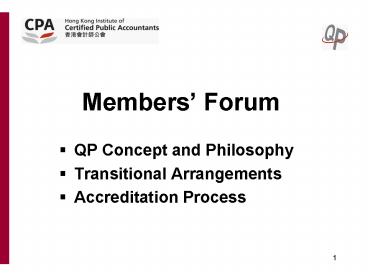Members Forum PowerPoint PPT Presentation
Title: Members Forum
1
Members Forum
- QP Concept and Philosophy
- Transitional Arrangements
- Accreditation Process
2
Purpose
- We need to understand and appreciate what our
education standards - Why we need to establish our own qualifying
benchmarks in Hong Kong
3
QP Concept and Philosophy
- Objectives of New Professional Accreditation
Framework - To ensure that professional accountants will have
the required competency to meet future
challenges - To establish our own benchmarks for competency
standards for professional accountants in Hong
Kong - To achieve international recognition
- Benchmarking to best international practices on
accreditation, education and training
4
Content, Standards Quality
- The 1997 blueprint outlined a new Professional
Accreditation System covering the following
aspects of qualifying process - Pre-entry education
- Graduate entry (international norm)
- Accreditation of academic qualifications
- Qualification Programme
- Competency-based standards
- Practical experience
- A structured Authorised Employer/Supervisor
scheme
5
CPA Designation
6
QP Training Philosophy
- Develop skills in application of knowledge
problem identifications and solving - Develop professional judgment
- Develop generic skills within business context
- (eg communication, interpersonal and leadership
skills) - Integrate knowledge across fields
7
QP Trains Candidates to
- Research
- Apply knowledge to solve practical problems
- Integrate knowledge across technical areas
- Work with others to achieve common goals
- Communicate effectively
- Be exposed to simulated practical situations
8
HKICPA Qualification Programme
9
Benefits of QP
- Shortest route to qualify as CPA (Practising),
with full exemptions from Hong Kong PC
Examinations - 2-Paper exemptions with CICPA
- Internationally recognised
- - Get designations of CPA / CA / ACCA
- - In Australia, New Zealand, UK and others.
10
HKICPA / CPA Membership Admission
ACCA, CPAA ICAEW exempted
11
Benefits of QP
- Next targeting recognition in Canada
- Government recognition Continuing Education Fund
- Only need 5,000 to get a professional
qualification
12
Recognised Overseas Accountancy Bodies
13
Review of Existing Recognition Arrangements
- Notice to discontinue existing recognition
arrangements with effect from 1 July 2005 given
to - MRA ACCA, CPA Australia
- Unilateral recognition AIA, AICPA, CICA, CIMA
and CIPFA
14
Review of Existing Recognition Arrangements
- Purpose To bring uniformity and consistency to
the future standard of our membership admission - Delegated authority to qualify members
- Introduction of evaluation process
- To assess overseas qualifications for mutual
recognition purpose
15
Transitional Arrangements
Prof. Exam Experience Aptitude Test
Membership
- CPA Australia
- Pass all exams before 31 Dec 2005
- For applications received on or after 1 July
2005 - Experience after 1 Jul 2005 under AE/AS
- Aptitude Test applies after 1 Jul 2005
- AIA, AICPA, CICA, CIMA, CIPFA
- HKICPA will honour membership applications before
1 July 2005
16
Transitional Arrangements
- ACCA
- Relevant degree holders - Pass all exams before 1
July 2005 - Non-relevant degree holders Pass all exams
before 1 July 2006 - For applications received on or after 1 July
2005 - Experience after 1 Jul 2005 under AE/AS
- Aptitude Test applies after 1 Jul 2005
- Bridging Programmes for conversion to QP
framework (under approval by Council)
17
Accreditation Process for Recognition
- Document entitled Information for Professional
Bodies seeking Recognition published on HKICPA
website www.hkicpa.org.hk - Outline review process
- To assess overseas qualifications for mutual
recognition purpose - Process, procedure and criteria Open, clear and
transparent
18
Review Process
- Indepth assessment of
- Tertiary education
- The professional programme
- Practical experience
- Also cover to a lesser extent assessment of
- The profession and general environment
- Requirements for maintenance of membership e.g.
continuing professional development
19
Review Process 3 step approach
- Step 1
- Professional body to complete Questionnaire
(Appendix 1) - Desk Review To establish if there is substantial
gap and whether to proceed to Step 2 - Agree reviewer (independent consultant)
20
Review Process 3 step approach
- Step 2
- Submit detailed information (Appendix 2)
- Reviewer to conduct a desk review of information
submitted
21
Review Process 3 step approach
- Step 3
- Only when Steps 1 and 2 desk review completed to
the satisfaction of HKICPA for full recognition
status - Site Visit by Reviewer to Professional Bodys
home country to assess (Appendix 3) - Quality of personnel involved
- Quality of implementation of procedures
documented, etc - Covering the areas under reviews
22
Outcome of Review Process
- Detailed Review Report
- Based on HKICPA requirements ie QP framework as
the benchmarks - HKICPA will use Report and other information to
determine the level of recognition to be given - HKICPA Committees and Council to deliberate on
recommendation - Discussion with Professional Body
- HKICPA will formally advise the Professional Body
of its decision
23
Accreditation Process
- Consistency and uniformity of standards are our
aims - This is our responsibility as the statutory body
for the profession in Hong Kong
24
- Thank-you very much!

